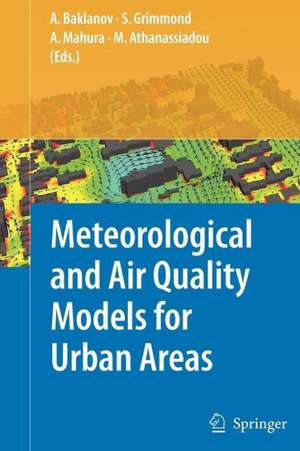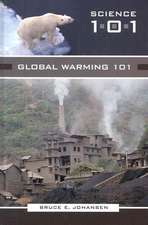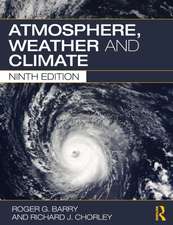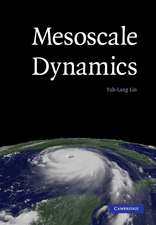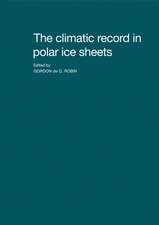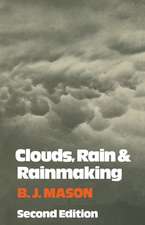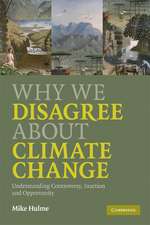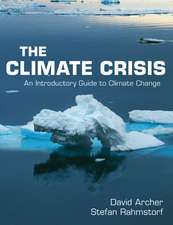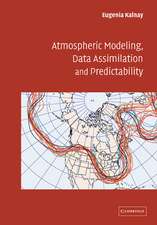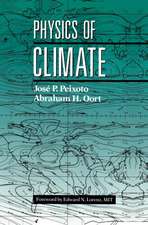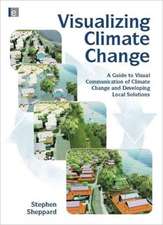Meteorological and Air Quality Models for Urban Areas
Editat de Alexander Baklanov, Sue Grimmond, Alexander Mahura, Maria Athanassiadouen Limba Engleză Paperback – 13 aug 2009
Based on the selected presentations given at the COST728 workshop, the contributions are arranged in four parts: urban morphology and databases; parameterizations of urban canopy; strategy for urbanization of different types of models; and evaluation and city case studies / field studies. The chapters treat either dynamic (on wind and turbulent) and thermal effects (on temperature and energy in general). The final chapter of this volume summarizes the discussion and conclusions from the four main topics and provides recommendations and future requirements.
This monograph is oriented towards numerical weather prediction and air quality modelling communities.
Preț: 710.10 lei
Preț vechi: 865.98 lei
-18% Nou
Puncte Express: 1065
Preț estimativ în valută:
135.97€ • 140.26$ • 112.69£
135.97€ • 140.26$ • 112.69£
Carte tipărită la comandă
Livrare economică 20 februarie-06 martie
Preluare comenzi: 021 569.72.76
Specificații
ISBN-13: 9783642002977
ISBN-10: 3642002978
Pagini: 204
Ilustrații: XVIII, 184 p. 38 illus., 14 illus. in color.
Dimensiuni: 155 x 235 x 15 mm
Greutate: 0.29 kg
Ediția:2009
Editura: Springer Berlin, Heidelberg
Colecția Springer
Locul publicării:Berlin, Heidelberg, Germany
ISBN-10: 3642002978
Pagini: 204
Ilustrații: XVIII, 184 p. 38 illus., 14 illus. in color.
Dimensiuni: 155 x 235 x 15 mm
Greutate: 0.29 kg
Ediția:2009
Editura: Springer Berlin, Heidelberg
Colecția Springer
Locul publicării:Berlin, Heidelberg, Germany
Public țintă
ResearchCuprins
Urban Morphology and Databases.- Facilitating Advanced Urban Meteorology and Air Quality Modelling Capabilities with High Resolution Urban Database and Access Portal Tools.- Relating Small-Scale Emission and Concentration Variability in Air Quality Models.- Performance of Different Sub-Grid-Scale Surface Flux Parameterizations for Urban and Rural Areas.- Parameterizations of Urban Canopy.- How to Use Computational Fluid Dynamics Models for Urban Canopy Parameterizations.- Review of Japanese Urban Models and a Scale Model Experiment.- Urban Soil-Canopy-Atmosphere Exchanges at Submesoscales: Learning from Model Development, Evaluation, and Coupling with LES.- The Effect of Stratification on the Aerodynamic Roughness Length.- Strategy for Urbanization of Different Types of Models.- FUMAPEX Experience of Model Urbanisation.- Evolution of Urban Surface Exchange in the UK Met Office’s Unified Model.- Sensitivity Tests in the Dynamical and Thermal Part of the MRF-Urban PBL Scheme in the MM5 Model.- Evaluation and Case Studies / Observations.- Urban Surface Energy Balance Models: Model Characteristics and Methodology for a Comparison Study.- Measuring Meteorology in Urban Areas – Some Progress and Many Problems.- Derivation of Vertical Wind and Turbulence Profiles, the Mixing-Layer Height, and the Vertical Turbulent Exchange Coefficient from Sodar and Ceilometer Soundings in Urban Measurement Campaigns.- Verification and Case Studies for Urban Effects in HIRLAM Numerical Weather Forecasting.- Model Urbanization Strategy: Summaries, Recommendations and Requirements.
Textul de pe ultima copertă
This book, based on the selected presentations given at the COST728 workshop, is concerned with the following main topics/chapters:
1. Urban morphology and databases,
2. Parameterisations of urban canopy,
3. Strategy for urbanization of different types of models,
4. Evaluation and city case studies / field studies.
The chapters were concerned with dynamic (on wind and turbulent) and thermal effects (on temperature and energy in general). The final chapter of this volume summarizes the discussion and conclusions from the four main topics and provides recommendations and future requirements.
The book is oriented towards numerical weather prediction and air quality modelling communities.
1. Urban morphology and databases,
2. Parameterisations of urban canopy,
3. Strategy for urbanization of different types of models,
4. Evaluation and city case studies / field studies.
The chapters were concerned with dynamic (on wind and turbulent) and thermal effects (on temperature and energy in general). The final chapter of this volume summarizes the discussion and conclusions from the four main topics and provides recommendations and future requirements.
The book is oriented towards numerical weather prediction and air quality modelling communities.
Caracteristici
Gives an overall view of the current situation in urbanization of meteorological and air quality models around the world Discusses and makes recommendations on the best practice and strategy for urbanization of different types of meteorological and air quality models Includes supplementary material: sn.pub/extras
